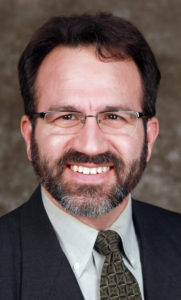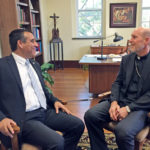By Dr. William Benevento
(Editor’s note: Catholic Health Care today features Catholic health care experts from St. Thomas Aquinas Guild of the Quad Cities sharing their thoughts on timely issues.)
Without a doubt, all of us will develop cataracts. None of the natural lenses we were born with stay clear forever. So the important question is not “Do I have a cataract?” but rather “Is my cataract worth removing?” To put it as many patients do: “Is my cataract ripe yet?”

This simple question is not easy to answer, especially as it depends so much upon the individual and their personality. Cataracts are a lot like dirty glasses; when they bother you, it’s worth cleaning them. If they don’t bother you much, it’s not. A detail-oriented engineering type (e.g. doctor, accountant, etc.) might be bothered by a seemingly mild cataract, whereas a “go with the flow” type might not notice much of an issue at all. This also feeds into expectations after cataract surgery. I tell my patients: “I’m not God, and you’re not a widget” (so don’t expect perfection when dealing with human tissue). Just like dirty glasses, cataracts don’t hurt the eyes, but they also don’t get better on their own. If you don’t like your vision now, don’t expect it to spontaneously improve.
Anyone considering cataract surgery has to be able to weigh the risks, benefits and alternatives, “informed consent,” in medical parlance. The greater the risk, for instance, of someone with a history of trauma to the eye, the less likely they’re going to want a mild cataract removed. Additionally, the less the benefit, for instance, of someone with severe macular degeneration or glaucoma, the less likely they’re going to want that mild cataract removed. But even in these cases, we sometimes do surgery. A patient who just needs to get one more line of vision on the eye chart to pass their driver’s test would be a good example of this.
Contrary to what most patients think, they’re never too old to have cataract surgery. Medical reasons may cause the surgery to be more difficult, but age isn’t one of them. Removing a cataract is a quality of life issue, and you’re never too old to try to see well. My oldest patient was 98 years old. She also had macular degeneration, and couldn’t read books anymore (she used to read a book a week). After cataract surgery, her vision as expected wasn’t perfect, but she was able to get back to reading large-print books, which she did for almost two years before she passed away. As Catholics, we believe in the value of every life. As ophthalmologists, we try to add quality to that life.
Never having had cataract surgery myself, it’s hard for me to fully understand the change patients notice after surgery. I’ve had patients tell me, “It’s like seeing everything in HD.” I had a patient get up off the table, see the clock on the wall for the first time in months, and start crying. Perhaps one of the most famous cataract patients was the artist Monet. Monet’s cataracts were so significant that they changed his perception of color, to the point at which he had to label his tubes of paint and memorize where the colors were on his palette. His paintings of this period have a significant shift toward red hues, and there is a noticeable return to his earlier style after his cataract surgery in 1924.
Few of the “cataract paintings” exist. Monet destroyed most of them. Most of the time patients are surprised by their vision, as was Monet. The cataracts come on so gradually that they don’t really remember what it was like to really see well.
Gratitude, joy and satisfaction — I am privileged to see and experience this in my practice, both personally and in my patients. I have an appreciation for seeing the beauty around me, especially as I know some who cannot — in spite of our best efforts. As I write this, we are having a late spring snow, the flakes gently falling out of the sky, dusting the plants and trees still waiting for warmer weather. I want others to see this, too, to be able to see creation in all its glory, and to appreciate God’s work. Thankfully, God has given us the tools to make this happen for the vast majority of our patients.
(Dr. William Benevento of Eye Surgeons Associates is a board-certified ophthalmologist with a special interest in diabetes and the surgical treatment of cataracts with the latest techniques. He is a member of St. John Vianney Parish in Bettendorf.)











